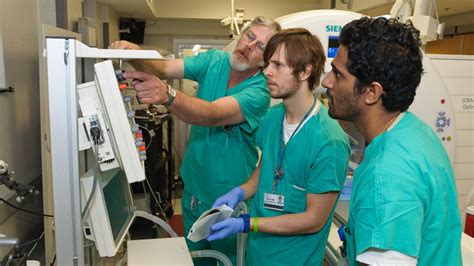The field of medical engineering is rapidly evolving, offering exciting opportunities for individuals passionate about applying engineering principles to healthcare challenges. A medical engineering internship provides invaluable experience for students seeking to enter this dynamic industry.

Benefits of Medical Engineering Internships
- Gain hands-on experience: Internships provide practical exposure to cutting-edge medical technologies and engineering processes.
- Build professional connections: Interns interact with industry professionals, developing valuable networking opportunities for future employment.
- Explore career paths: Internships allow students to explore different sectors within medical engineering, such as biomaterials, medical devices, and healthcare data analytics.
- Enhance technical skills: Through research projects and hands-on assignments, interns develop their technical abilities in areas such as medical imaging, biomechanics, and medical informatics.
- Prepare for graduate studies: Internships provide a valuable foundation for pursuing advanced degrees in medical engineering or related disciplines.
Types of Medical Engineering Internships
Research and Development (R&D): Interns work on the development and testing of new medical technologies, such as medical devices, imaging systems, and surgical robots.
Product Design and Development: Interns assist in the design, prototyping, and testing of medical products, ensuring their safety, efficacy, and user-friendliness.
Biomaterials Engineering: Interns investigate the development and application of biocompatible materials for medical implants, scaffolds, and tissue engineering.
Medical Device Testing and Evaluation: Interns conduct tests and analyze data to assess the performance, safety, and usability of medical devices.
Healthcare Data Analytics: Interns work with large datasets to analyze patient information, identify trends, and develop data-driven solutions for healthcare challenges.
Finding Medical Engineering Internships
- University career centers: Most universities have career centers that maintain databases of internship opportunities.
- Industry websites: Many medical engineering companies post internship opportunities on their websites.
- Professional organizations: Professional organizations such as the American Society for Biomaterials (ASB) and the IEEE Engineering in Medicine and Biology Society (EMBS) offer internship listings.
- LinkedIn: LinkedIn is a prominent platform for finding internships and connecting with professionals in the field.
- Networking: Attend industry events and conferences to network with potential employers.
Eligibility and Qualifications
Typically, medical engineering internships are open to undergraduate and graduate students pursuing degrees in biomedical engineering, chemical engineering, mechanical engineering, or related disciplines. Requirements may include:
- GPA of 3.0 or higher
- Relevant coursework in biomaterials, medical devices, or biomedical engineering
- Research or project experience
- Strong communication and teamwork skills
Tips and Tricks
- Start early: Apply for internships as soon as they are posted.
- Tailor your resume and cover letter: Highlight your relevant skills and experiences, and demonstrate your interest in the specific company or organization.
- Practice your interview skills: Prepare for technical and behavioral interview questions.
- Network: Attend industry events, connect with professionals on LinkedIn, and reach out to alumni in your field.
- Consider unpaid internships: Unpaid internships can provide valuable experience and demonstrate your commitment to the field.
Common Mistakes to Avoid
- Applying for internships you’re not qualified for: Be realistic about your eligibility and apply only to internships that match your skills and experience.
- Not preparing for the interview: Practice your answers to technical and behavioral questions, and research the company or organization.
- Ignoring networking opportunities: Attend industry events and connect with professionals in your field to expand your network and uncover potential internship opportunities.
- Not following up: After submitting your application, follow up with the hiring manager via email or LinkedIn to express your continued interest.
- Being unprofessional during the internship: Maintain a professional demeanor, complete your assignments on time, and respect the company’s policies and procedures.
Creative New Word: “Medtech”: Charting New Paths in Healthcare Technology
“Medtech” is a portmanteau of “medical” and “technology” that embodies the innovative fusion of engineering and healthcare. It encapsulates a wide range of disciplines, from the development of life-saving medical devices to the application of big data in personalized medicine.
Tables
Table 1: Medical Engineering Internship Types and Industries
| Internship Type | Industries |
|---|---|
| Research and Development | Medical device manufacturers, pharmaceutical companies, research institutions |
| Product Design and Development | Medical device manufacturers, healthcare technology companies |
| Biomaterials Engineering | Tissue engineering companies, medical research labs |
| Medical Device Testing and Evaluation | Medical device manufacturers, testing laboratories |
| Healthcare Data Analytics | Healthcare providers, insurance companies, data analytics firms |
Table 2: Medical Engineering Internship Eligibility and Qualifications
| Requirement | Undergraduate | Graduate |
|---|---|---|
| GPA | 3.0 or higher | 3.2 or higher |
| Coursework | Biomaterials, medical devices, biomedical engineering | Advanced-level coursework |
| Research or project experience | Preferred | Required |
| Communication and teamwork skills | Strong | Excellent |
Table 3: Medical Engineering Internship Benefits
| Benefit | Value |
|---|---|
| Hands-on experience | Develop practical skills |
| Professional connections | Build industry relationships |
| Career exploration | Identify career paths |
| Technical skill enhancement | Hone technical abilities |
| Preparation for graduate studies | Lay foundation for advanced degrees |
Table 4: Medical Engineering Internship Tips and Tricks
| Tip | Benefit |
|---|---|
| Start early | Increase chances of securing internship |
| Tailor resume and cover letter | Showcase relevant skills and interest |
| Practice interview skills | Prepare for technical and behavioral questions |
| Network | Expand professional connections and discover opportunities |
| Consider unpaid internships | Demonstrate commitment and gain valuable experience |
